
Data Science – Analytics and Applications
Springer Fachmedien Wiesbaden GmbH (Verlag)
978-3-658-32181-9 (ISBN)
Organisationen sind bereits von der starren Struktur des klassischen Projektmanagements zu agilen Ansätzen übergegangen. Dies gilt auch für Softwareentwicklungsprojekte, die flexibel sein müssen, um schnell auf die Wünsche der Kunden reagieren zu können und um Änderungen zu berücksichtigen, die aufgrund von Architekturentscheidungen erforderlich sind. Nachdem sich die Datenwissenschaft als Eckpfeiler in Organisationen und Unternehmen etabliert hat, ist es nun zwingend erforderlich, diesen entscheidenden Schritt auch für analytische Geschäftsprozesse durchzuführen. Die nicht-deterministische Natur der Datenwissenschaft und die ihr innewohnenden analytischen Aufgaben erfordern einen interaktiven Ansatz für eine evolutionäre, schrittweise Entwicklung zur Realisierung der wichtigsten Geschäftsanwendungen und Anwendungsfälle.
Die 3. Internationale Konferenz zur Datenwissenschaft (iDSC 2020) brachte Forscher, Wissenschaftler und Wirtschaftsexperten zusammen, um Möglichkeiten zu erörtern, wie neue Wege zur Umsetzung agiler Ansätze in den verschiedenen Bereichen der Datenwissenschaft, wie maschinelles Lernen und KI, Data Mining oder Visualisierung und Kommunikation, sowie Fallstudien und Best Practices von führenden Forschungseinrichtungen und Wirtschaftsunternehmen etabliert werden können.
Der Tagungsband umfasst alle im wissenschaftlichen Track vorgestellten Volltexte und die Kurzbeiträge aus dem studentischen Track.
Zu den Themen, die Sie interessieren, gehören unter anderem:
- Künstliche Intelligenz und Maschinelles Lernen
- Implementierung von Data-Mining-Prozessen
- Agile Datenwissenschaft und Visualisierung
- Fallstudien und Anwendungen für Agile Datenwissenschaft
Organizations have moved already from the rigid structure of classical project management towards the adoption of agile approaches. This holds also true for software development projects,which need to be flexible to adopt to rapid requests of clients as well to reflect changes that are required due to architectural design decisions. With data science having established itself as corner stone within organizations and businesses, it is now imperative to perform this crucial step for analytical business processes as well. The non-deterministic nature of data science and its inherent analytical tasks require an interactive approach towards an evolutionary step-by-step development to realize core essential business applications and use-cases.
The 3rd International Data Science Conference (iDSC 2020) brougt together researchers, scientists, and business experts to discuss means of establishing new ways of embracing agile approaches within the various domains of data science, such as machine learning and AI, data mining, or visualization and communication as well as case studies and best-practices from leading research institutions and business companies.
The proceedings include all full papers presented in the scientific track and the short papers from the student track.
Among the topics of interest are:
- Artificial Intelligence and Machine Learning
- Implementation of data mining processes
- Agile Data Science and Visualization
- Case Studies and Applications for Agile Data Science
lt;p>Peter Haber is a Professor of Information and Communication Technology, in particular for analog and digital signal processing, and responsible coordinator for system theory and electrical engineering at Salzburg University of Applied Sciences. He is a researcher and project manager, leading and coordinating national and international projects in the field of IT and IT management, while also integrating data science solutions at businesses. Since 2009 he has been a member of the international advisory board for the IATED conferences.
Thomas Lampoltshammer is an Assistant Professor for ICT and Deputy Head of the Centre for E-Governance at the Department of E-Governance and Administration, Danube University Krems, Austria. His current research focus is on the domain of data governance, the effects of ICT application in a connected society, and the effects on a data-driven society. He has a substantial background in the design and implementation of expert and decision-making systems, data analytics, and semantic-based reasoning.
Manfred Mayr is the Academic Program Director for "Business Informatics and Digital Transformation" as well department head for IT-Management at Salzburg University of Applied Sciences. He is a lecturer at international conferences and the author of various publications in the field of business informatics and researches business applications of data science. The digitalisation of ERP applications in the industrial environment is a long-standing and important field of his research. In addition, he has coordinated several national and international research projects.
Kathrin Plankensteiner is the Head of "Data Analytics & Intelligence" at the research center Digital Factory Vorarlberg, FH Vorarlberg University of Applied Science. She studied technical mathematics and data analysis and holds a PhD in Applied Statistics from the University of Klagenfurt (Austria). Her field of research includes reliability testing and analyzing, lifetime modeling, regression analysis, computational statistics, multivariate data analysis, statistical inference, reasoning, & statistical machine learning.
The editors are the conference chairs of the International Data Science Conference.
-------
Peter Haber ist Professor für Informations- und Kommunikationstechnik, insbesondere für analoge und digitale Signalverarbeitung, und verantwortlicher Koordinator für Systemtheorie und Elektrotechnik an der Fachhochschule Salzburg. Er ist Forscher und Projektleiter, leitet und koordiniert nationale und internationale Projekte im Bereich IT und IT-Management und integriert datenwissenschaftliche Lösungen in Unternehmen. Seit 2009 ist er Mitglied des internationalen Beirats für die IATED-Konferenzen.
Thomas Lampoltshammer ist Assistenzprofessor für IKT und stellvertretender Leiter des Zentrums für E-Governance am Lehrstuhl für E-Governance und Verwaltung, Donau-Universität Krems, Österreich. Sein aktueller Forschungsschwerpunkt liegt auf dem Gebiet der Datenverwaltung, den Auswirkungen der IKT-Anwendung in einer vernetzten Gesellschaft und den Auswirkungen auf eine datengesteuerte Gesellschaft. Er verfügt über einen substantiellen Hintergrund im Design und in der Implementierung von Experten- und Entscheidungssystemen, Datenanalyse und semantisch-basierter Argumentation.
Manfred Mayr ist Akademischer Programmdirektor für "Wirtschaftsinformatik und digitale Transformation" sowie Abteilungsleiter für IT-Management an der Fachhochschule Salzburg. Er ist Vortragender bei internationalen Konferenzen und Autor verschiedener Publikationen im Bereich der Wirtschaftsinformatik und forscht zu betriebswirtschaftlichen Anwendungen der Datenwissenschaft. Die Digitalisierung von ERP-Anwendungen im industriellen Umfeld ist ein langjähriges und wichtiges Feld seiner Forschung. Darüber hinaus hat er mehrere nationale und
Abstracts of Industry Contributions.- Non Peer-Reviewed Invited Papers.- German Abstracts of Peer-Reviewed Full Papers.- Peer-Reviewed Full Papers.- Data Science Frameworks.- Bayesian Analysis.- Optimizing Methods for Data Science.- Deep Learning Applications
| Erscheinungsdatum | 02.02.2021 |
|---|---|
| Zusatzinfo | XV, 120 S. 77 Abb., 53 Abb. in Farbe. Book + eBook. |
| Verlagsort | Wiesbaden |
| Sprache | deutsch |
| Maße | 210 x 279 mm |
| Gewicht | 541 g |
| Themenwelt | Mathematik / Informatik ► Informatik ► Datenbanken |
| Informatik ► Theorie / Studium ► Algorithmen | |
| Informatik ► Theorie / Studium ► Künstliche Intelligenz / Robotik | |
| Schlagworte | Artificial Intelligence • Big Data • Cloudera • data analytics • Data Mining • Data Science • Data Science applications • Data Science Conference • Data Visualization • digitale Transformation • FutureTDM • Human Machine Interface • Industrial Application Scenarios • Industry Track • Legal Landscape • machine learning • Research Track • Salzburg University of Applied Sciences • Supervisory Control and Data Acquisition (SCADA) • tensorflow |
| ISBN-10 | 3-658-32181-4 / 3658321814 |
| ISBN-13 | 978-3-658-32181-9 / 9783658321819 |
| Zustand | Neuware |
| Informationen gemäß Produktsicherheitsverordnung (GPSR) | |
| Haben Sie eine Frage zum Produkt? |
aus dem Bereich


